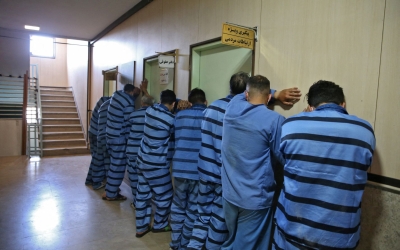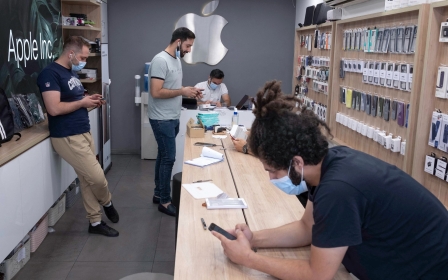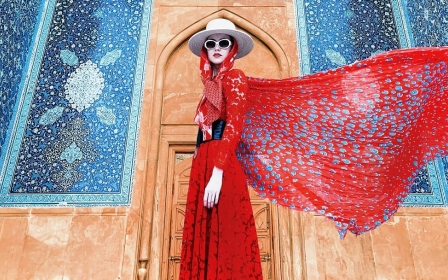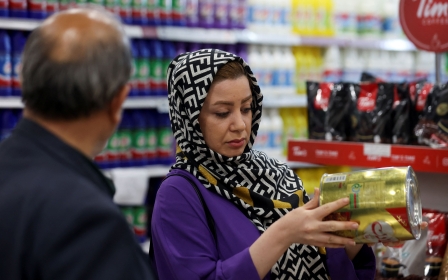Crime wave hits Tehran as thousands of Iranians pushed into poverty
As Iranian film director Morteza Fatemi fled robbers last month, one of his assailants cried out a chilling warning: "Wherever you go, I will find you."
Fatemi was attacked by men with machetes near the Mellat cinema in an affluent part of northern Tehran. It is just one example of a crime wave sweeping a suffering Iran.
As the sanctions-hit country gets poorer, its people are becoming ever more desperate in their efforts to make ends meet.
Iranians have been placed under great stress caused by United States sanctions and internal mismanagement.
Rouzbeh Kordouni, the head of Iran's Social Security Research Institute, announced in May that 15 percent of the population were under the absolute poverty line between 2013 and 2017, but this figure reached 30 percent in just two years, between 2018 and 2020.
New MEE newsletter: Jerusalem Dispatch
Sign up to get the latest insights and analysis on Israel-Palestine, alongside Turkey Unpacked and other MEE newsletters
That spike coincided with the unilateral withdrawal by the US from the 2015 nuclear deal and reimposition of harsh sanctions.
The government of President Ebrahim Raisi says that it is trying to curb high inflation, but so far it has not been successful. In fact, costs have been rising every month, according to Iran's Statistics Centre.
According to the labour and social welfare ministry, it is alarming if the inflation rate increases by about 1.5 percent. Yet the Statistics Centre revealed that inflation in May rose about 12.2 percent from April, and for food alone was 25.9 percent higher.
Celebrities no immune from robberies
Fatemi managed to escape the robbers by jumping into a car, but he had been followed for a while. He said he was struck by the thieves' boldness.
Similarly, the former coach of the national junior freestyle wrestling team became the target of an armed robbery on Tehran's Imam Ali highway. The gunmen stole Ali Safai's Toyota Land Cruiser and shot him twice in the left leg.
It's not just the wealthy and well-known who are being targeted. Wallets and phones are violently taken from people daily, and Iranians are worried.
"A few weeks ago, two men on a motorcycle stole my mobile phone while I was in a taxi. I was busy with my phone, reading a message with the window down in the car. Suddenly, the robbers grabbed it from my hand," said student Mohsen Yazdanshenas.
"The 'Find my iPhone' feature didn't work for me, and filing a report in the police station was like torture, as it was very difficult and time-consuming. There has been no outcome so far."
Reports have emerged of metal being stripped from the streets, including manholes, foundations of pedestrian bridges, traffic signs, electric wires and telecommunications cables.
A few months ago, Tehran municipality said traffic equipmant worth 55bn tomans ($12.9m) had been stolen.
This ranges from guardrails, warning and direction signs to cameras and electronic equipment at bus stations. Last winter, the theft of metal bridge fittings caused a part of the Shahid Hamdani highway to be closed for over two weeks.
Frail economy the root cause
Many experts say the rise in crime has a direct correlation with increasing poverty and the widening social class gap.
"All economic variables, especially unemployment and lack of purchasing power, have a direct impact on theft, pickpocketing, robbery, and all kinds of crimes that are committed with the sole aim of affording to live," said a sociologist and university professor in Tehran who spoke to MEE on condition of anonymity.
"If the basic needs, including food, housing, and so forth are endangered, all other needs will be neglected. Therefore, when people's livelihood is threatened, they do wrong things, such as robbery, and they have no fear of doing it because they have nothing to lose."
In 2009, around 200,000 thefts were reported. By 2021, that figure had grown by a factor of seven, with about 1.4 million thefts recorded that year.
'When people's livelihood is threatened, they do wrong things, such as robbery, and they have no fear of doing it because they have nothing to lose'
- Iranian sociologist
Alireza Lotfi, a high-ranking Tehran police commander, has said 50 percent of these robberies are committed by people who have had no prior criminal record.
He, too, said economic conditions have affected the crime rate, dismissing any suggestion they were unrelated.
The sociologist told MEE: "Security becomes meaningful when basic needs are met. The feeling of insecurity is very harmful economically, politically, culturally, and socially."
Iran is experiencing "a social crisis," said a veteran journalist who declined to have her name used. She told MEE the rising rate of theft is an unprecedented phenomenon in the country.
"The age of those who commit robbery has unfortunately decreased to the extent that some children below 10 are pickpocketing," she said.
"These children belong to families that do not have good financial conditions. So, these children go to the streets to steal and help their families."
Middle East Eye delivers independent and unrivalled coverage and analysis of the Middle East, North Africa and beyond. To learn more about republishing this content and the associated fees, please fill out this form. More about MEE can be found here.





